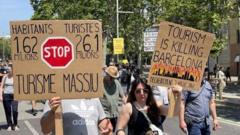On Sunday, a wave of activists marched through the bustling streets of Barcelona, directly confronting tourists by proclaiming, "Go Home!" The scene saw puzzled vacationers caught in the crossfire of a growing discontent as demonstrators armed with water pistols drenched onlookers while plastering stickers on luxury stores announcing that tourists were no longer welcome.
Barcelona is renowned for its vibrant tourism sector, drawing in millions of visitors each year. Yet, as crowds swell, an increasing number of locals find themselves feeling marginalized in their own city. The situation resonates throughout southern Europe, where residents are becoming vocal about the debilitating effects of overtourism.
Holding her sign that read "Your AirBnB used to be my home," local resident Marina lamented the plight of city goers forced to deal with soaring rents exacerbated by increasing numbers of short-term rental properties. Critics have been vocal about the damaging consequences of cruise ships docking in the city, with many bearing placards declaring that such practices are "killing" Barcelona.
While the protesters indicated that they are not against tourism altogether, they voiced the need for a more sustainable management approach. "We're not against individual tourists; it's the extent of tourism we are concerned with," remarked Elena, a young marine biologist who highlighted the affordability crisis where even simple luxuries like coffee are out of reach for many residents.
Even longstanding locals like 80-year-old Pepi Viu have faced the brunt of this crisis, as her ten-year residence faced conversion into a tourist rental, leaving her scrambling to find an affordable home. As she expressed her distress, she illustrated the sentiments of countless residents witnessing rapid changes to their neighborhoods, "I feel like I have no protection and it's upsetting."
In the heart of the Gothic quarter, Joan Alvarez fights to retain his family’s long-held flat amidst rising pressures. With his landlord pushing to convert residences into tourist accommodations, he remains staunch, maintaining that "it shouldn't be like that."
Conversely, landlords like Jesus Pereda argue that they are being unfairly targeted, highlighting that the real issue lies with economic pressures from "digital nomads" entering the local market, rather than the tourists they host. As he contemplates the upcoming ban on short-term tourist rentals set for 2028, he voices deep concerns about the implications for the local economy.
Signaling the intensity of the protests, chants of "You're all guiris!" resonated as crowds ignited firecrackers, while police barricaded routes in a bid to manage escalating tensions. In the face of similar sentiments protruding in Spain's neighboring countries, the future implications of tourism management loom large as Spain braces for an unprecedented summer influx.






















